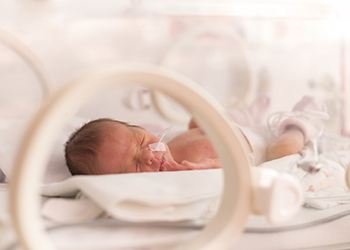
Data access has been approved for a project aiming to fill knowledge gaps about the long-term prognoses for infants with prenatal factors and severe neonatal morbidity that put them at risk for neurological and psychiatric disorders in childhood and early adulthood.
A research team lead by Dr. Sarka Lisonkova, Associate Professor in the Department of Obstetrics and Gynaecology, University of British Columbia and the Children’s and Women’s Hospital, will employ advanced epidemiological approaches to analyze uniquely-rich population data sources available in British Columbia (BC), Canada and Sweden.
The project will analyze 3.7 million pregnancies and construct virtual birth cohorts, including term and preterm infants with up to 22 years of follow-up, to uncover the rates of significant neurological impairment and psychiatric outcomes (e.g., autism spectrum disorders and bipolar disorder), in childhood and adolescence among children born at various gestational ages. They will also seek to understand the temporal trends in the incidence of these outcomes within successive birth cohorts.
The associations between prenatal risk factors (e.g., pregnancy complications leading to preterm birth) and mediators (such as severe neonatal morbidity, e.g., infections, small-for-gestational age) with psychiatric disorders, will also be investigated.
“Ultimately our team aims to create prediction models to identify individual factors that place infants (born at preterm and term gestation) at lower or higher risk of morbidity and mortality later in life (basically that predict good or poor outcomes) using predictive models and machine learning techniques,” says Professor Lisonkova.
For the project PopData will link Medical Services Plan, Discharge Abstract Database, Vital Events and Statistics Deaths, National Ambulatory Care Reporting System and PharmaNet data from the BC Ministry of Health with data sets from the BC Perinatal Data Registry, Immigration, Refugees and Citizenship Canada, the BC Autism Assessment Network and the Early Developmental Instrument.
The findings will be relevant to clinicians, parents, and children, adolescents and young adults who were born preterm, or at risk for adverse neurodevelopmental outcomes, and to decision/policy makers. The team plan to publish in leading pediatric, neonatology, psychiatric, and general medical journals and present results at conferences and professional meetings that are attended by researchers and health care providers in Canada (e.g., at the Canadian National Perinatal Research Meeting and the SOGC Annual Meeting), in North America (e.g., Society for Maternal-Fetal Medicine, Pediatric Academic Societies), and globally (e.g., the World Congress of Perinatal Medicine).